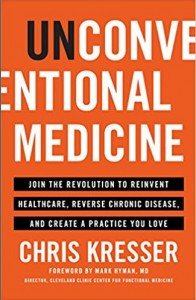Unconventional Medicine A Health Cure?

The world is facing the greatest healthcare crisis it has ever seen. Chronic disease is shortening our lifespan, destroying our quality of life, bankrupting governments, and threatening the health of future generations. Sadly, conventional medicine, with its focus on managing symptoms, has failed to address this challenge. The result is burned-out physicians, a sicker population, and a broken healthcare system.
In Unconventional Medicine, author Chris Kresser presents a plan to reverse this dangerous trend. He shows how the combination of a genetically aligned diet and lifestyle, functional medicine, and a lean, collaborative practice model can create a system that better serves the needs of both patients and practitioners.
Consider the following (scary) statistics:
- One in two Americans now suffers from chronic disease, and one in four has multiple chronic conditions.
- Chronic disease is responsible for seven of ten deaths each year.
- The rate of chronic disease in kids more than doubled between 1994 and 2006.
- 84 percent of the $3.8 trillion we spend on healthcare in the United States each year goes toward treating chronic disease.
We’ve reached the point where chronic disease has become so common that we think it’s normal.
Chronic disease is not a small problem. It’s an insidious, slow-motion plague that is exploding through Western populations, shortening our lifespan, destroying our quality of life, bankrupting our country, and threatening the very survival of our species.
The consequences for patients are painfully obvious. Consider the following:
- Two-thirds of Americans are overweight, and one in three is obese. According to a recent report, half of Americans will be obese by 2030.
- The prevalence of autism spectrum disorder (ASD) more than doubled from 2000 to 2010—and not just because of increased rates of detection.
- Rates of autoimmune disease have doubled or tripled over the past 50 years (depending on which estimate you look at) and are expected to continue to rise sharply.
- Over half of adults take prescription drugs, and 40 percent of the elderly take more than five medications.
 Unconventional Medicine is both a manifesto and a roadmap to a more effective and humane approach to healthcare, it is the opposite of conventional medicine. It’s based on the recognition that we’ve reached an inflection point at which we can no longer afford not to act on a massive scale, and that the action we take must not come out of the same system that caused—and continues to cause—these problems in the first place.
Unconventional Medicine is both a manifesto and a roadmap to a more effective and humane approach to healthcare, it is the opposite of conventional medicine. It’s based on the recognition that we’ve reached an inflection point at which we can no longer afford not to act on a massive scale, and that the action we take must not come out of the same system that caused—and continues to cause—these problems in the first place.
Kresser’s book is firmly rooted in the latest science and statistics, yet it is brought to life by case studies of patients and stories of healthcare practitioners who have been affected by our dysfunctional “sickcare” model. It also provides a practical clinical framework for how the body’s physiological systems are linked together and how their functions are influenced by both environment (diet, lifestyle, microbes, allergens, environmental toxins, and stresses) and genetics.
Most chronic disease is preventable, and much of it is reversible. This book is your guide to understanding how.
